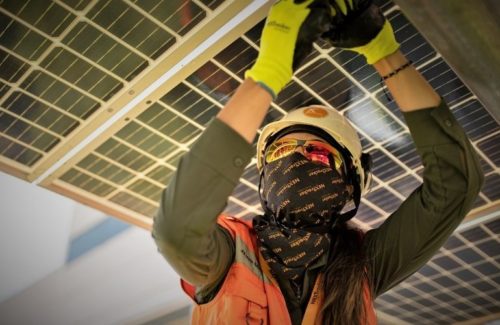The Department of Commerce today announced that it will investigate further the claim that Chinese solar panel manufacturers have moved portions of their manufacturing operations to Southeast Asia as a way to circumvent antidumping and countervailing (AD/CV) duties. The operations of Chinese companies working in Cambodia, Malaysia, Thailand and Vietnam will be explored further.
This investigation is in response to a petition filed in February by California-based solar panel assembler Auxin Solar. AD/CV duties have been in place against Chinese solar manufacturers since 2012. Auxin Solar claims that Chinese solar panel makers are producing portions of solar panels in facilities in Southeast Asia to avoid paying the duties.
Auxin Solar CEO Mamun Rashid released the following statement: “For years, Chinese solar producers have refused to fairly price their products in the U.S. and have gone to significant lengths to continue undercutting American manufacturers and workers by establishing circumventing operations in countries not covered by those duties. We are grateful Commerce officials recognized the need to investigate this pervasive backdoor dumping and how it continues to injure American solar producers. Fair trade and enforcement of our trade laws are essential to rebuilding the American solar supply chain and making solar in America again.”
The large majority of the global solar industry — including advocacy groups, utility-scale installers and fellow solar panel makers — came out against Auxin’s petition, with many describing Auxin’s allegations as “seriously flawed” and incredibly harmful to the U.S. installation market. The only on-record backing Auxin received was from a few loyal U.S. installers and a handful of Congressmembers.
While Chinese companies have set up production plants in other countries, whether they are doing it as a way to circumvent the hefty tariffs the United States placed on Chinese-made solar panels is the main debate of this investigation. U.S. imports of solar panels from China have dropped in the last decade, while the majority of imported solar panels are now coming from Southeast Asia. A report last year stated that solar panels from Malaysia, Thailand and Vietnam made up 80% of U.S. crystalline silicon module supply in the first half of 2021.
First Solar, a thin-film solar module manufacturer with over 2 GW of U.S. production capacity supplying the domestic utility-scale market, released an op-ed last week calling Chinese setups of manufacturing operations in Southeast Asia “textbook circumvention.” The Chinese companies mentioned in Auxin’s petition (JinkoSolar, LONGi, Canadian Solar, Trina Solar and more) largely supply the U.S. utility-scale market, which is expected to need around 15 GW of panels in 2022. Without access to “affordable” panels coming from Southeast Asia, many utility-scale projects will no longer make financial sense. U.S. solar panel companies cannot supply the country’s full demand.
There is access to non-Chinese solar panels coming out of Southeast Asia. Hanwha Q CELLS is a South Korean company but has a manufacturing hub in Malaysia. Maxeon is headquartered in Singapore and also has a major manufacturing facility in Malaysia. How Commerce will treat these global solar players remains to be seen. Maxeon CEO Jeff Waters told Solar Power World last week he is confident the company could receive an exclusion if any tariffs were to hit Malaysia due to Maxeon’s premium pricing.
“People can accuse us of many things as a company, but the one thing they can’t is being somebody that’s dumping with pricing,” Waters said. “We sell at a significant premium to our customers and for good reason. There’s a lot we bring as a company that warrants that, including our panels. If something gets through, we feel we’ve got a compelling case to say there’s no way we as a company are dumping, and we can stand behind that.”
Abigail Ross Hopper, president and CEO of SEIA, said today’s decision by the Dept. of Commerce goes against the Biden Administration’s goal of growing clean energy in the United States.
“This misstep will have a devastating impact on the U.S. solar market at a time when solar prices are climbing, and project delays and cancellations are adding up,” she said on the potential 250% tariffs being suggested. “The solar industry is still reeling from a similar tariff petition that surfaced last year. The mere threat of tariffs altered the industry’s growth trajectory and is one of the reasons why we’re now expecting a 19% decline in near-term solar forecasts. Taking up this case will have a chilling effect on the solar industry.”
George Hershman, CEO of SOLV Energy, the nation’s largest utility-scale solar installer, has long been vocal against any further tariffs in the solar industry.
“This decision is a devastating blow that will cost the solar industry tens of thousands of jobs,” he said. “Solar companies across the country are already experiencing unprecedented delays up and down the supply chain. The continued threat of tariffs poses a significant barrier that will drag out projects and drive up costs.”
The American Clean Power Association (ACP) responded to today’s decision with even harsher words.
“The Department of Commerce’s decision today signals that the Biden Administration’s talk of supporting solar energy is empty rhetoric. If its commitment to a clean energy future is real, the Administration will reverse this decision immediately,” said ACP CEO Heather Zichal. “America’s solar workers and the clean energy community are watching and will remember. Overnight, the Commerce Department ignored precedent and subsequently drove a stake through the heart of planned solar projects and choked off up to 80% of the solar panel supply to the U.S. It must fix this now.”






